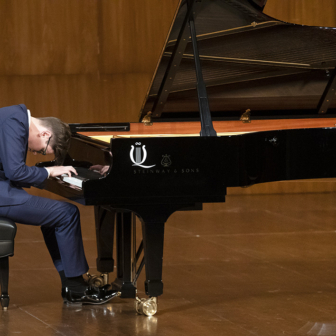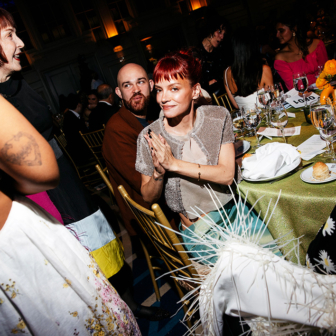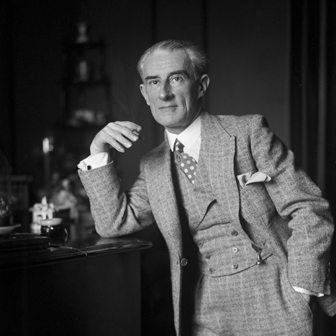The last letters exchanged between the composer Benjamin Britten and his partner of nearly forty years, the tenor Peter Pears, are profoundly touching. They are reprinted in the sixth and final volume of Britten’s letters, Letters from a Life, and also, in facsimile, in a new volume, Lucy Walker’s Britten in Pictures. There’s something about seeing the words handwritten on crumpled aerograms that only adds to their poignancy.
In November 1974, Pears was singing Britten’s final opera, Death in Venice, at the Metropolitan Opera in New York. The composer, prevented from travelling by the heart disease that would kill him two years later, was at home in England when he heard a BBC radio broadcast of the two of them performing his settings of Thomas Hardy. He wrote to Pears, “I have just listened to a re-broadcast of Winter Words… and honestly you are the greatest artist that ever was – every nuance, subtle + never over-done – those great words, so sad + wise, painted for one, that heavenly sound you make, full but always coloured for words + music. What have I done to deserve such an artist and man to write for?”
Pears replied: “You say things which turn my heart over with love and pride… But you know love is blind, and what you do not see is that it is you who have given me everything… I am here as your mouthpiece and I live in your music.”
So it was a symbiotic musical relationship, the singer inspiring the composer, the composer making the singer’s career. But it was also a very odd voice. I happen to love it, but there are plenty of people who can’t abide the sound. Not so long ago I played a short recording featuring Pears on The Music Show and we received a rare complaint from a listener.
Britten seems to have been inspired by odd voices – that singular contralto Kathleen Ferrier was another of them – but Pears is special because so much of Britten’s vocal music is tailored to it. Pears’s voice, which reminded mutual friends of Britten’s mother’s singing voice, was quite heady, even slightly nasal, and it came with a generous vibrato. It was not one of those singer vibratos that can’t be switched off: Pears had complete control over it, but he used it liberally. His voice also became a little drier with the passing years and gathered a range of affectations. But the major idiosyncrasy, which was there from the start, was the great vocal strength that Pears found around the note E, precisely the spot at which many tenor voices have a weakness. The famous aria from Peter Grimes, “Now the Great Bear and Pleiades,” starts on E, remains there for the entire first line and keeps returning to it.
Because Britten knew this voice so intimately, it entered his musical thinking early on, and as the voice changed so Britten subtly adapted his approach to writing for it, always showing off its strengths. This means that for someone today singing the role of Grimes, say, or Albert in Albert Herring, or Captain Vere in Billy Budd, or Aschenbach in Death in Venice, there is a problem. And it’s the same in the great song cycles from Seven Sonnets of Michelangelo to Who Are These Children?, from the Serenade for tenor, horn and strings to the Nocturne. It is not simply that he must decide whether to listen to the famous recordings sung by the man for whom the pieces were written, usually with the composer providing his seal of approval at the piano or on the conductor’s podium. It is not even the knowledge that when Britten imagined this music, the sound he heard in his head was Pears. It is more fundamental. Pears’s voice is actually written into the notes and so it is hard not to sound a bit like him.
It is now twenty-six years since the tenor died – though older than the composer, he outlived him by a decade – and thirty-three years since he stopped singing, so today’s tenors, most of whom have no first-hand experience of Pears’s voice, are better placed than their forebears to find their own way through this music. With Britten’s centenary falling this year, there’s certainly a lot of that music to be sung.
Ian Bostridge is the best-known and most successful of this new generation, and his latest CD of Britten’s songs shows a tenor voice going its own way, maturing nicely and always approaching the music afresh. There are myriad little touches in these interpretations that are all Bostridge’s own. Another tenor who has a wonderfully open – one might almost say innocent – approach to the songs is James Gilchrist. It’s such an unaffected voice he makes you hear the music and words as though for the first time.
But the new CD that most surprises me has Gerald English, back in 1969, singing the Serenade with the German horn player Hermann Baumann and the Cologne Radio Symphony Orchestra conducted by the great John Barbirolli. It’s a German radio recording, never before available, and the performance is remarkable because it shows that even in Britten’s lifetime it was possible to rethink his music. This is such a different interpretation from the classic recorded accounts with Pears. English’s voice is rounder, more lyrical and more conventionally beautiful, though it lacks nothing in sheer dramatic power (even if, at the start, he sounds a little distant). His customary perfect diction is also on show. I worked with English quite a lot in the 1980s and 90s, and the diction was always crystal clear.
Barbirolli, too, goes his own way, as was his wont. The Tennyson setting, “The splendour falls on castle walls,” is quite extraordinarily slow until it reaches the “Blow, bugle, blow” refrain when it is quite extraordinarily swift. I have never heard such a radical reimagining of a Britten song, and one wonders whether the BBC broadcast the concert. If he heard it, what did Britten think? What, for that matter, did Pears think? •




